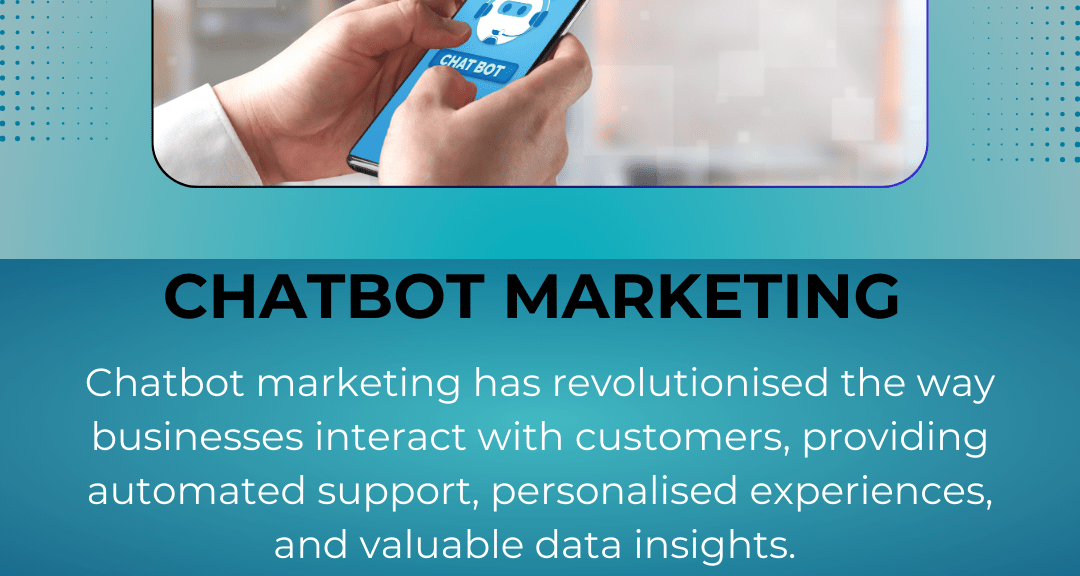As the world of digital marketing evolves, businesses are constantly seeking innovative ways to enhance customer interactions and streamline support processes. In recent times, chatbot marketing has emerged as a powerful tool to automate customer engagement, provide seamless support, and gather valuable data. In this article, we will explore the potential of chatbot marketing and discuss how implementing chatbots on websites or messaging platforms can revolutionise customer experiences and drive business growth.
The Rise of Chatbot Marketing:
Chatbots have transformed from simple conversational agents to sophisticated AI-powered assistants capable of simulating human-like interactions. Leveraging natural language processing and machine learning, chatbots have become an integral part of customer support and marketing strategies for businesses across various industries.
- Automating Customer Interactions:
Chatbots empower businesses to offer real-time, round-the-clock support to customers without the need for human intervention. These virtual assistants can handle a wide range of customer inquiries, such as product information, order status, and FAQs, providing instant responses and enhancing customer satisfaction.
By automating routine interactions, businesses can free up their customer support teams to focus on more complex issues, leading to improved efficiency and reduced response times.
- Seamless Support and Personalization:
Chatbots have the ability to engage customers in personalised conversations based on their preferences and past interactions. By analysing user data and behaviour, chatbots can tailor responses and recommendations, creating a more personalised experience for each customer.
Additionally, chatbots can guide users through the sales process, helping them find products or services that match their needs. This personalised support fosters a sense of trust and loyalty, leading to increased customer retention and repeat business.
- Data Collection and Analysis:
Chatbots act as invaluable data collectors, gathering essential insights into customer behaviour, preferences, and pain points. This data can be analysed to identify patterns, trends, and areas for improvement, enabling businesses to make data-driven decisions and refine their marketing strategies.
By understanding customer preferences and pain points, businesses can fine-tune their offerings, launch targeted marketing campaigns, and deliver personalised recommendations, ultimately driving higher conversion rates and customer satisfaction.
Implementing Chatbots for Marketing Success:
- Define Clear objectives:
Before implementing chatbots, establish clear objectives for their role in your marketing strategy. Determine the specific tasks and interactions you want chatbots to handle, such as providing customer support, guiding users through a sales funnel, or collecting feedback.
- Optimise the user experience:
Ensure that your chatbot offers a seamless and user-friendly experience. Focus on natural language processing to make conversations feel more human-like and less robotic. Implement a user-friendly interface with clear call-to-action buttons and straightforward navigation to guide users effectively.
- Personalization is key:
Utilise the data collected by chatbots to deliver personalised experiences to users. Tailor responses and recommendations based on their preferences and past interactions. Personalization fosters a sense of connection and increases the likelihood of customer engagement and conversion.
- Constant Learning and Improvement:
Chatbots are not static; they require continuous learning and improvement. Monitor customer interactions regularly and analyse the data to identify areas where the chatbot can be optimised. Incorporate user feedback to enhance the chatbot’s capabilities and refine its responses.
Conclusion:
Chatbot marketing has revolutionised the way businesses interact with customers, providing automated support, personalised experiences, and valuable data insights. By leveraging chatbots to automate customer interactions, deliver personalised support, and gather essential data, businesses can enhance customer satisfaction, drive engagement, and ultimately boost their bottom line. As technology continues to advance, chatbots are poised to play an even more significant role in the future of marketing, making it essential for businesses to embrace this innovative approach to stay ahead in the competitive digital landscape.


